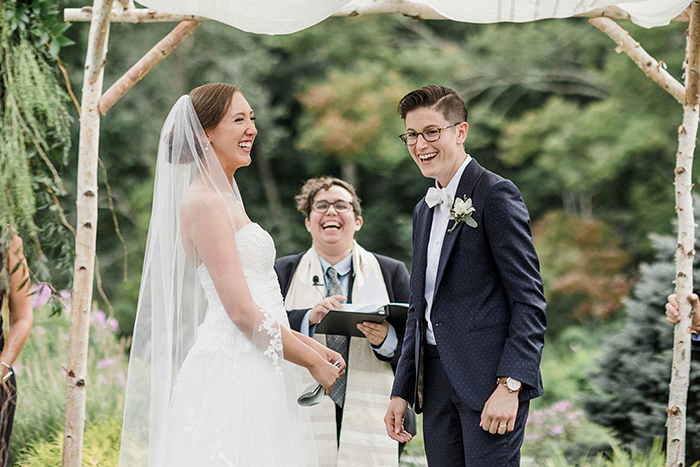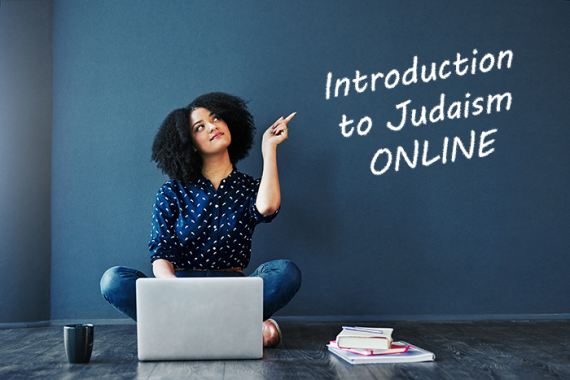
Engaged to be married? Mazel tov! After sharing the happy news with those near and far, here’s what to know as you get started planning your Jewish (or Jew-ish) wedding ceremony.
SELECTING A DATE
Traditionally, Jewish weddings are not held on Shabbat, Jewish festivals, or High Holy days. The focus of such days is intended to be the communal joy of Shabbat or the holiday rather than the more personal joy of a wedding celebration. Additionally, most rabbis and cantors do not officiate on days of mourning such as Tishah B'Av and Yom HaShoah.
No one expects you to be an expert on the Jewish calendar, although this list of upcoming holidays can help.
Contacting your clergy or officiant early on in your planning can help you avoid scheduling your wedding on a day that may make some family and friends uncomfortable and when clergy and officiants are unlikely to be available.
Booking Your Venue
While Jewish weddings often take place in a synagogue, a chuppah, or marriage canopy, can be raised anywhere, so it’s not surprising that many couples choose to marry in other types of settings, including outdoors.
As you choose your wedding venue, consider how the venue can be the most accommodating and welcoming to your guests. Uneven ground, unpaved paths, stairs, and grassy areas can be difficult to navigate for people using wheelchairs or other assisted mobility devices. If there are stairs, are there also ramps and elevators? Ask whether your venue provides access to single-person or all gender restrooms. Will the menu accommodate dietary preferences and needs?
Request that your officiant use a microphone and consider providing assistive devices for those who may need them. If you are having loud music during the reception, plan for designated quieter areas.
Choosing Your Wedding Officiant
Having your Jewish (or Jewish-ish) wedding officiated by an ordained rabbi or cantor can add a meaningful Jewish frame to your “big day.”
If you’re already connected to a rabbi or cantor, whether presently or from your childhood, don’t hesitate to reach out. They will be delighted to hear from you! If they are unavailable to officiate, they may be able to recommend others. If not, consider reaching out to the clergy of your nearest Reform congregation.
Here are some tips to help make the process of choosing an officiant a little less overwhelming:
- Understand your and your partner’s expectations and preferences: Are you looking for someone who will simply show up at your wedding and perform the ritual? Are you looking for someone who will take time to get to know you and let you get to know them? Are you looking for someone who is interested in your perspectives and preferences regarding Jewish ritual and practice? Do you want to be part of a decision-making process that will lead to an individualized, personal ritual? Would you rather have a fixed liturgy, determined by the officiant?
- Don't hesitate to ask questions. After choosing one another, choosing your officiant is the most important choice regarding your ceremony. Your officiant will set the tone and shape your ceremony. You deserve to have the right officiant for you both as individuals and as a couple. With the right officiant, you will remember and value not only the day of your wedding, but also the preparatory time you spent together. Reform clergy gladly officiate at weddings for LGBTQ+ couples. Most Reform clergy officiate for interfaith couples. Some, but not all, are available for weddings before sundown on Saturday (even when it is still Shabbat). An officiant with an inclusive approach will offer possibilities and work with you to create a meaningful wedding ceremony that will resonate throughout your married lives.
PRE-MARITAL Meetings
Most clergy meet with couples several times prior to a wedding. The purpose of these meetings is not only to discuss specifics related to the ceremony, but also to get to know you and explore issues related to sustaining a long-term committed relationship. You may discuss money, family dynamics, religious practice, children, and other topics.
Pre-marital conversations are intended to strengthen you as a couple, establish healthy ways to communicate openly with each other, and resolve the differences and conflicts that arise in any loving relationship. Clergy members bring years of experience and specialized training to these meetings.
A popular Jewish story imagines Rabbi Nachman walking behind a group of partygoers on the way home from a wedding. Each guest remarks in turn about what a great time they had, the delicious food, and wonderful music. “Those people weren’t at the real wedding,” thinks the rabbi. When another wedding guest chimes in with, “thank goodness those two got together!” the rabbi declares, “Now THAT person was at the real wedding.” Remember: while the details of your wedding ceremony and celebration matter, what’s most important is your love and commitment to each other, both on your wedding day and for many happy years to follow!
Do you have any other questions related to planning your wedding? Explore more resources, including how to create an inclusive Jewish wedding ceremony.
